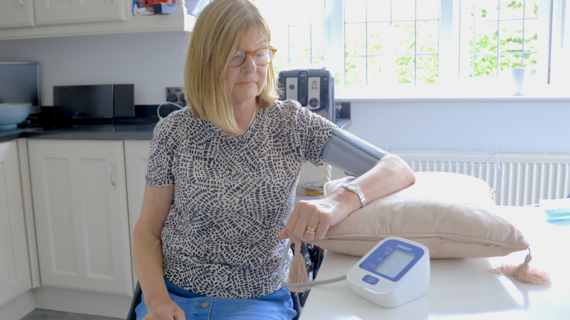
Local residents first in line to benefit from blood pressure monitoring kits
It is estimated* that approximately 250 heart attacks and 375 strokes will be prevented over a course of five years as nearly 20,000 residents in Essex are now benefitting from free blood pressure monitoring kits to help support self-care and prevent the risk of heart disease, heart attacks and stroke.
Essex residents were first in line thanks to a successful bid from Mid and South Essex Health and Care Partnership who were selected to be a trailblazer as part of a national pilot to test out how residents can improve their health outcomes through self-monitoring their blood pressure.
At the end of March 2020, nationally, there were over 2 million people below the age of 80 with uncontrolled hypertension and more than 325,000 people aged 80years+. Ensuring patients at high risk are being monitored regularly prevents further complications and hence poorer outcomes.
Patients wrap the small machine around their upper arm to measure their blood pressure reading and send the reading to their GP to review by telephone, email or through a digital remote monitoring platform.
The rollout supports the NHS Long Term Plan ambitions to prevent up to 150,000 heart attacks, strokes, and dementia cases over the next 10 years.
Dr Taz Syed, local GP and digital clinical lead said: “Thanks to the hard work of staff behind the scenes, our health and care system has had a head start in trialling this technology, saving lives, making it easier to prevent crisis and keep people healthy and independent for as long as possible. It’s vital that people with high blood pressure keep track of their levels, so they can report any significant changes that could indicate a potentially deadly stroke or heart attack, and this simple but lifesaving innovation offers people efficient and convenient care.
“By using these monitors, and reporting the readings to local teams, patients are able to quickly and easily update GP teams with a regular snapshot of their blood pressure health. These simple checks will help us to save lives”.
The initial pilot saw 1,265 blood pressure kits rolled out to GP surgeries across mid and south Essex to three target population groups:
- Patients who are clinically extremely vulnerable and had been shielding, with a last recorded blood pressure 150mmHg /90mmHg were provided with a basic BP monitor
- Patients who are clinically extremely vulnerable and who have had a prior stroke or transient ischaemic attack (TIA) and last recorded blood pressure of systolic BP > 150mmHg and/or diastolic BP > 90mmHg and do not already have a diagnosis of atrial fibrillation (AF), to be provided with a BP monitor that can detect AF
- Group 3: Patients whose last recorded blood pressure of systolic BP > 150mmHg and/or diastolic BP > 90mmHg and are not in groups 1 and 2, encouraged to buy a validated BP monitor
Residents from these groups received the free kits also and information about how they could make healthy lifestyle changes to lower their chances of getting high blood pressure. They then take readings once or twice a day over the period of a week and someone from their local practice then then goes through the results and discuss the appropriate action which might be lifestyle advice or, if necessary, make adjustments to the medication as necessary.
The pilot has now been extended in terms of the number of devices and encouragement of patients to purchase their own devices resulting in 19,535 patients in mid and south Essex now participating in the scheme and providing results to over 80% of our practices.
In addition to the BP@Home programme six lead ECG devices have been provided to primary care and community teams and feedback from our community nurses in mid and south Essex is that we are avoiding admissions for our residents.
This impressive achievement came about through hard work, determination and the commitment of the team to deliver the best care for their patients, despite the pressures from the COVID-19 pandemic.
It’s not always clear what causes high blood pressure, but there are things that can increase your risk.
You might be more at risk if you:
- are overweight
- eat too much salt and do not eat enough fruit and vegetables
- do not do enough exercise
- drink too much alcohol or coffee (or other caffeine-based drinks)
- smoke
- do not get much sleep or have disturbed sleep
- are over 65
- have a relative with high blood pressure
- are of black African or black Caribbean descent
- live in a deprived area
Making healthy lifestyle changes can sometimes help reduce your chances of getting high blood pressure and help lower your blood pressure if it’s already high.
